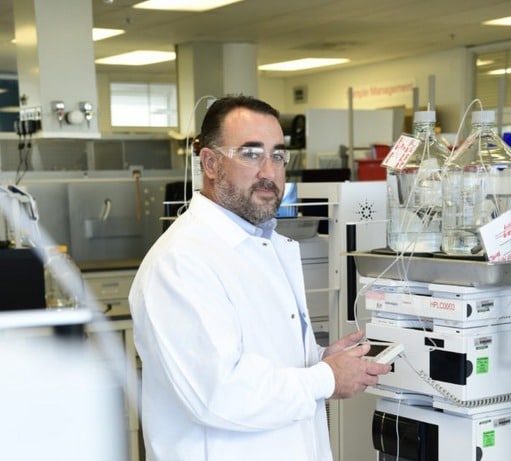Mike Dalton, Eli Lilly Chemist

Sometimes, it’s a funky-looking “i” in the red Eli Lilly and Company logo that tips Mike Dalton off to fraud. Or an irregular dimple pattern on the tinfoil wrapper. Crooks who mass-produce counterfeit pharmaceuticals are creative and ambitious, peddling billions of dollars of fake drugs around the world.
It’s Dalton’s job to stop them.
His forensic lab at Lilly detects counterfeit medicines and works with law enforcement to bring criminals to justice. With the help of other Lilly departments (global security, manufacturing, legal) and his two-person staff, Dalton tests confiscated samples, examines packaging, produces a report, and serves as an expert witness at trial.
“Sometimes we get loose tablets,” says Dalton, a 47-year-old Indianapolis native who heads Lilly’s Global Product Protection Technical Team. “Sometimes we get pharmacy bottles. Sometimes I get a kilo of white powder that I don’t know what it is. Every sample we get in, we handle as potential evidence in court.”
Shutting down fraud saves Lilly money and protects the drug manufacturer’s reputation and trademark, but Dalton emphasizes the human cost. While an impotent dose of the erectile-dysfunction drug Cialis could ruin a night, fake insulin or cancer drugs could prove fatal.
“There is no such thing as a safe counterfeit,” says Dalton, who has a biology degree from Purdue. “Patient safety is our utmost concern.”
Though constantly evolving, pharmaceutical fraud is nothing new. For Lilly, it began in the ’80s, when crooks peddled antibiotics. In the ’90s, it was Prozac, and then the schizophrenia drug Zyprexa. Next came a wave of lifestyle drugs, and now lifesaving drugs.
“When you have a product that is high-demand and high-priced, that’s going to be a drug counterfeiter’s target,” Dalton says. “It’s not hard to make a tablet. Counterfeiters can do that very easily.”
The internet is a boon to con artists. Websites lure customers with heavily discounted prices. The fake drug’s packaging looks convincing, and serial numbers can be faked. Sometimes, the tampered meds contain traces of the original substance, according to chemist Christa Mulkey, a 27-year Lilly veteran who works in Dalton’s lab. “A lot of time, they want something in it because they want return customers,” she says.
The most notorious cases are the stuff of Hollywood thrillers. In one heist in Connecticut, two Cubans scaled a Lilly warehouse, drilled a hole in the roof, rappelled down a rope, heaped $75 million of drugs on a tractor-trailer, and escaped. They were later identified because one thief touched a water bottle and left his fingerprints behind.
In another infamous case, Robert Courtney, a pharmacist in Kansas City, diluted cancer medications, sold them for full price, and pocketed the difference. (A Lilly sales rep tipped off a doctor.) Many scams originate overseas in India, China, and South America, where drugs are produced in filthy conditions. And then there’s CanadaDrugs.com, which sold $78 million of unapproved, mislabeled, and counterfeit cancer drugs in the U.S., banking on American confidence in its northern neighbors.
“Everything is good in Canada, right?” Dalton says.
Sadly, dealers who once trafficked heroin and cocaine have shifted into the pharmaceutical biz, where profit margins are higher and penalties are lighter than for dealing narcotics.
“We sometimes think the counterfeiters are counterfeiting each other’s stuff, it’s so prevalent,” Dalton says. “Where there’s a demand, the counterfeiters will find a way to meet it.”
The best part of Dalton’s job—its unpredictability—can also be its most frustrating. An early riser, Dalton wakes up at 4:15 a.m., works out at the Lilly gym, and arrives to the lab (a former walk-in freezer) at 6:30. And then … he never knows. “One phone call, one email, changes my day,” he says. “Before 7 o’clock, I have usually talked to people in three different countries.”
Of course, the problem is bigger than Lilly. Counterfeiters target their competitors—who Dalton works with, another perk of his job—and myriad other industries, from olive oil to ticket sales to lip balm. Outside of work, even Dalton has been swindled. A couple years ago, he bought a vintage No. 3 Yankees Babe Ruth jersey from a friend who had “a guy.” Dalton has triplets, so he always chooses that number.
When he first wore the shirt, his wife suggested it might not be authentic. Dalton looked more closely.
The name on the back of the jersey was “Bade Ruth.”





